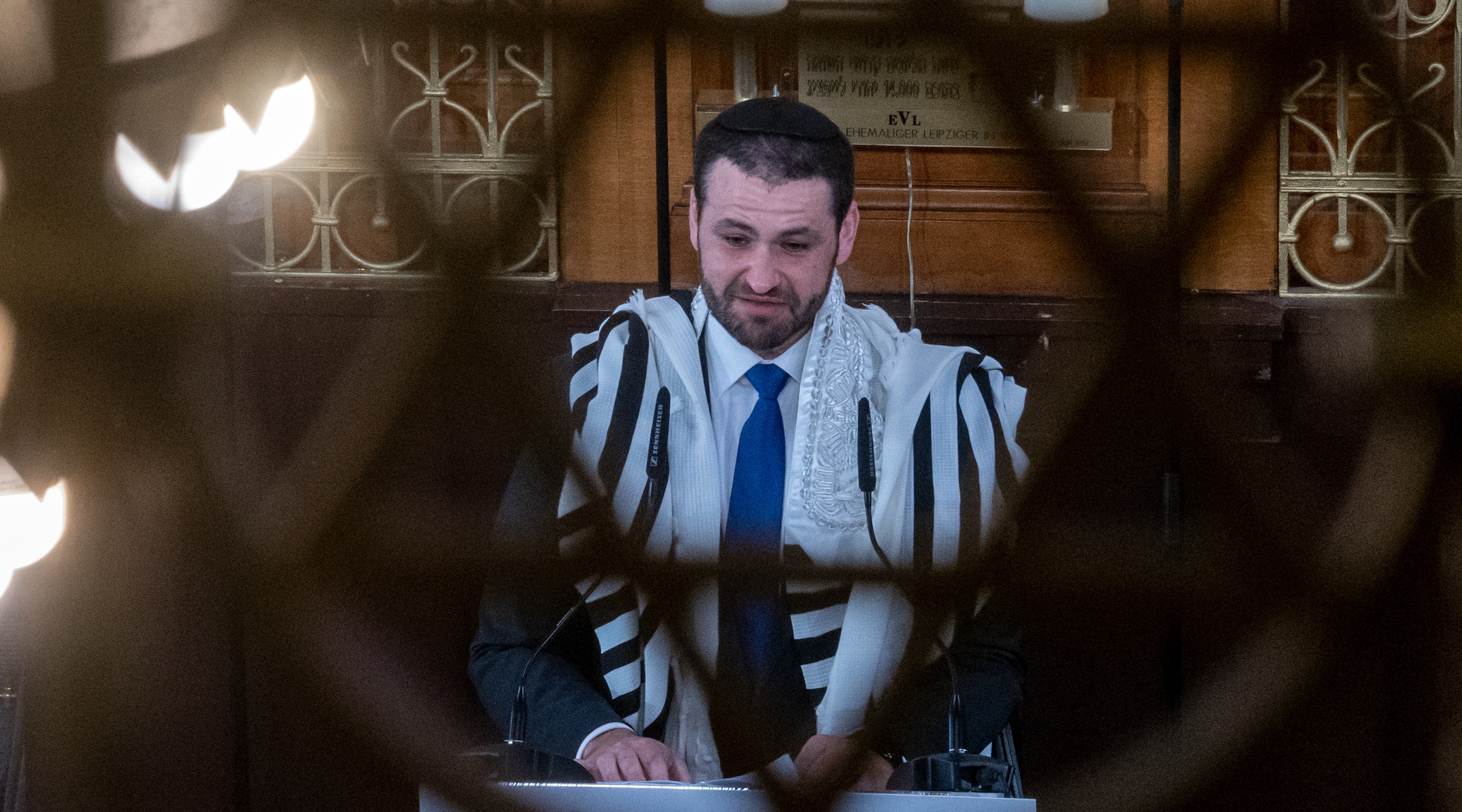A Berlin rabbi has been fired amid mounting allegations that he preyed on young women

BERLIN (JTA) — As a teenager in Berlin, Adelle was honored when a rabbi began showing interest in her spiritual development. Rabbi Reuven Yaacobov’s offer of personal instruction was an appealing prospect to the Russian-speaking immigrant with no documentation of her Jewish heritage.
Over time, Yaacobov’s private lessons escalated to phone calls and text messages and, ultimately, an invitation to a Shabbat dinner at his apartment, located so far from her home that she would need to stay over to avoid the prohibition on traveling on Shabbat.
There, Adelle was surprised to discover that Yaacobov’s wife was away and she was the only guest. After setting up the couch for Adelle, Yaacobov told her she needed a massage. There were points in her body, he said, where her energy was blocked.
He began with her back but ultimately told her that the points that needed attention — he called them chakras, a Hindu term, and sefirot, a term from Jewish mysticism — included her uterus.
“He said, ‘If I am not pressing it now, basically all that hard work I did’ – half an hour of hard work pressing on my back – ‘all that hard work is going to go to waste. If you don’t activate it all the way, it’s not going to work,’” Adelle recalled.
“I was very fresh to Jewish life. I didn’t know much,” she said. “I was not sure, but if it is a rabbi telling you that something is wrong [with you], you know, I kind of accepted it.”
After her formal conversion to Judaism, the touching escalated to pressure to have sexual intercourse, which Yaacobov said was permitted under Jewish law if he took her as a secret second wife.
He told Adelle that through her conversion she had absorbed the spirit of Batsheva, the Biblical woman whom King David famously spotted from afar and took as his wife — even though he had to have her husband killed to make it happen. Yaacobov said that only he, as a self-described descendant of David, had special powers to heal her.
When she balked, he told her that she would “stay a zero, just like you are now” and that her spiritual development would remain stunted.
“He made it very clear that I am a nobody at that point,” she recalled. “And, so, 19-year-old me, from not a very good family background — that was a statement that sounded true.”

Rabbi Reuven Yaacobov on stage during the ceremonial handover of a new Torah
Yaacobov’s hold over her was so complete, Adelle said, that when her Orthodox girls school announced that students could no longer associate with the rabbi, she rejected the warning.
“They summoned me to speak about that, and told me some horrifying things about him, and I was in complete denial,” she said. “I said, ‘No, no, it cannot be, he is a holy person. It cannot be, it’s wrong, you guys are wrong!’ I was fighting against them.”
That was in 2010. For years, Adelle told her story to no one. But eventually, she learned that “there was a whole team of Batshevas” — women like her whom Yaacobov had identified as vulnerable and groomed for sex, leveraging their naivete about Judaism to his advantage.
Now, Yaacobov has been fired from his position as the rabbi of Tiferet Israel, Berlin’s Sephardic synagogue, because of the alleged misconduct. His termination came just one day after Adelle and other women — organized by a onetime champion of Yaacobov named Elena Eyngorn — brought their stories to the Jewish Community of Berlin, the group that oversees most Jewish institutions in the city and employs some of its clergy.
“In view of the seriousness of the allegations, the Executive Board was shocked and outraged and immediately released Rabbi Yaacobov and finally fired him without notice effective May 31,” Ilan Kiesling, the organization’s spokesperson, said in a statement to the Jewish Telegraphic Agency.
He said Tiferet Israel would be “closed until the facts have been fully clarified” and that worshipers could pray at a nearby synagogue instead. He also said steps would be taken to prevent “such incidents in the future” and noted that a religious court, known as a beit din, might try Yaacobov according to Jewish law.
“The community has promised the victims unlimited support,” Kiesling said.
Yaacobov did not respond to JTA’s queries sent via Facebook messenger and WhatsApp.
Although the women and their advocates are relieved to see Yaacobov lose his pulpit, Yaacobov’s firing — which has not been publicly announced — is raising broader questions about the community and its guardrails. How could his alleged misconduct have gone unaddressed for years? Could someone have taken action earlier?
In fact, the Jewish Community of Berlin, the local police and an Orthodox rabbinical court in Moscow all received complaints about Yaacobov’s behavior with women in the past. The complaints predated the sweeping cultural shift around responses to sexual misconduct, known as #MeToo, that began in 2017 when the Hollywood producer Harvey Weinstein was accused of being a serial sex abuser.
“If Elena was able to do this in two weeks, to pressure the head of the community and get it done and get him to lose his job, how come all the powerful people that knew about it for years couldn’t take him down?” Adelle asked. “How come?”
Yaacobov has long been a popular spiritual leader in a subset of Berlin’s large community of Russian-speaking Jews. Born in Uzbekistan and ordained by the Midrash Sepharadi Yeshiva in Jerusalem, Yaacobov, 46 and a married father of three, also studied at the Moscow Yeshiva in Russia and the Shavei Gola Yeshiva in Jerusalem before being hired by the Jewish Community of Berlin 17 years ago, according to a biography that was removed from the organization’s website this month.
In addition to leading Tiferet Israel, Yaacobov has worked as a sofer, or ritual scribe, as a shochet or ritual slaughterer, and also as a mohel, performing brit milah, or traditional circumcision, on male infants. Sources in the community say he has performed circumcisions since being fired from his synagogue position. On his social media accounts, he posts inspirational videos and notes in Russian.
“Never, ever let others convince you that something is difficult or impossible,” he wrote in a post last week. “When you know what you want, and you want it bad enough, you’ll find a way to get it.”
The full scope of the allegations against Yaacobov is still unfolding. JTA has met with two women who say Yaacobov lured them into sexual relations, using pseudo-religious justifications, and spoken with a third who said she got away before he touched her. The women are being identified by pseudonyms because they asked that their names not be published.
Others told JTA they are aware of additional survivors. Eyngorn said she has spoken directly with nine, including the three with whom JTA spoke; new accounts continue to emerge, she said, as word spreads about her inquiries.
What is clear is that the testimony given to the Jewish Community of Berlin instigated immediate action — offering a sharp contrast to what happened at multiple other junctures when people raised concerns about Yaacobov’s behavior.
At least twice, women went to law enforcement but no charges resulted. In one case, Berlin’s top prosecutor declined to investigate the report it received, telling an attorney that because their client was a legal adult at the time of the incident and appeared to have been able to leave the scene if she wanted, there was no grounds for a criminal investigation.
Meanwhile, a woman who left Germany for Moscow gave a statement to the rabbinical court there over a decade ago, according to Rabbi Pinchas Goldschmidt, then the chief rabbi of Moscow. Goldschmidt, the longtime head of the Conference of European Rabbis, said he passed the complaint along to Lala Suesskind, then president of the Jewish Community of Berlin. He was not aware of any action taken in response.
Suesskind told JTA that she did not recall hearing from Goldschmidt but said she had received a different tip about Yaacobov’s behavior — which she dismissed as a rumor.
She said a Berlin rabbi whom she would not name had come to her with reports of sexual impropriety by Yaacobov during her tenure, which lasted from 2008 to 2012.
“I said, ‘Then bring the women to me.’ No one came. No one did anything,” Suesskind said. “I am someone who does not react to rumors and doesn’t spread them. I had no facts.”
The turning point against Yaacobov came this spring after Liza Khurgin, a volunteer at a Berlin conference for Russian-speaking Jews held in March, raised concerns about his behavior following a lecture he delivered on the topic of “Kosher Sex.” She told JTA she had objected to Yaacobov’s “sexist” comments and left early — then began to get repeated messages from the rabbi.
“I don’t know how he got my Telegram contact,” she said, referring to a secure text platform. “He started to message me that I looked sad and someone broke my heart and he can help. He started to call on Telegram and tried to contact me again on Facebook, and I did not reply.”
She added, “It was not appropriate. It was very weird. You don’t expect a rabbi to act this way.”
Khurgin urged the conference organizers never to invite Yaacobov again. The organizers in turn informed Eyngorn, a former president of Germany’s Federation of Jewish Students who had nominated him to speak. Having known Yaacobov for years — he even performed her son’s bris — she was shocked.
“Before accusing someone you have to check,” Eyngorn told JTA. “I started to investigate and … realized this story had a much longer history and was more terrible than I imagined.”
Stories started spilling out, spanning years and all following a similar trajectory. Eyngorn said several women told her about how Yaacobov “groomed” them over weeks and months — after checking their age, gradually winning their trust and fealty, and ultimately swaying them to accept intimate touching and submit to sexual acts by claiming that a secretive Jewish court had prescribed this treatment for them or — in another variant — claiming that only he, supposedly a descendant of King David, could rescue their souls.
Twisted invocations of scriptures and religious law are common among sexual predators who happen to be rabbis, said Rabbi Yosef Blau, spiritual guidance counselor and rosh yeshiva at the Rabbi Isaac Elchanan Theological Seminary at Yeshiva University in New York, and a longtime advocate for survivors of sexual misconduct in the Orthodox world.
Blau recalled being consulted about a different rabbi who had been accused of abusing teens.
“They were people who at this point knew very little about Jewish law, and therefore it was possible for him to manipulate them to think what he tells them is permissible is permissible,” Blau said. “He is the rabbi who is bringing them into Judaism, defining Judaism in his terms, and that gives him a certain measure of control over them.”
While the two women who met with JTA were not legally minors at the time of the alleged misconduct, they described themselves in hindsight as impressionable and vulnerable.
Sara, who first came under his sway when she was 18, recalled Yaacobov progressing from lessons in Kabbalah and Jewish law to telling her how to walk, do her hair and nails in order to be attractive to men. The next step seemed to follow logically: photographing her in her underwear, supposedly in order to check her “chakras.” He also told her he was a physiotherapist, which further undermined her skepticism, she recalled.
Afterward, “I just left in a kind of shock,” Sara told JTA. “I thought something is obviously seriously wrong with me; that is why all of the things are happening to me that I find so difficult. So he will fix them, right? And this is the discomfort I will have to go through.”
In their final meeting, she said, he told her that a secret Jewish court required her to perform oral sex on him. He insisted he was only acting in accordance with her spiritual needs — while making her swear not to tell anyone because of the risk of consequences in the “spiritual realm.”
Estie was a bit older than the other women who talked to JTA, no longer a teenager, when Yaacobov started chatting with her after she attended a lecture he gave on family values.
She had been going through a difficult phase, having just ended a relationship. “He said, ‘I will help you,’ and he immediately started to give me advice on how to get a good guy,” she said. After they met once in public, he invited her for “training.”
From there, her story mirrored those of Adelle and Sara.
“He said, ‘Your chakras are closed, you need to open up,’” Estie recalled. Then, he invited her to his home. She was looking forward to meeting the wife and children he spoke of so warmly, and bought some kosher candy as a gift. But when she arrived at his apartment, she discovered she was alone with him.
“He said he wanted to give me a massage,” she said. “It was a weird, uncomfortable situation. I am alone with a rabbi in his apartment and he wants to give me a massage – a full-body massage. He said, ‘You should be more open, you should open your buttons.’”
Estie said she made up an excuse and left. “I did not let him do it. I got out with very little damage.” Afterward, she said, he called her incessantly.
“He said he can help me and I am denying his help, and he made me feel really bad about myself,” she said.
Estie said she had been able to cope with her trauma, in part by jokingly referring to Yaacobov as “Reuven the Masseur.” But she said she was “shocked” when she found out, through Eyngorn, that other young women had been in a similar situation to hers.
“I didn’t know that it was his hobby. I didn’t know he was so bad, that he did much worse things,” she said.
“I really trusted him,” she added. “I told him my story about my breakup and I cried. He looks for people who are weak or vulnerable at the moment. He told me, ‘I will help you.'”
Adelle, Sara and Estie were all immigrants to Germany from the former Soviet Union; about 90% of German Jews today have roots there. While Estie was exploring her Jewish roots on her own, Adelle and Sara were attending an Orthodox school created to serve young Russian-speaking women amid a broad push to connect immigrants with the Judaism they had been prohibited from accessing under communism.
Their profile — young, Russian-speaking Jews on the search for spiritual fulfillment — may have made them targets. “According to my humble understanding it is a matter of finding vulnerable people,” said Rabbi Zsolt Balla of Leipzig, who has counseled Eyngorn and some of the women as they prepare to seek redress in a religious court.

Rabbi Zsolt Balla speaks in a synagogue in Saxony, Germany
“Someone who wants to groom people has to find the common denominator,” and in this situation, Balla said, “it was language.”
Shana Aaronson, the executive director of Magen-Israel, an advocacy group for survivors of sexual misconduct in religious communities in Israel, said it was significant that the rabbi’s alleged misconduct came as the women were being steeped in Orthodox Judaism, where rabbinic leadership confers power.
In Orthodox communities, “we are trained from an early age to do what the rabbi says,” Aaronson said. A predator’s “first step is an overstepping of boundaries, involving themselves in aspects of the person’s life that do not fall into the rabbi’s role: ‘Let me guide you and advise you on this, that and the other thing not related to their spiritual observance.”
Then, she said, they break down emotional boundaries, and ultimately give Jewish legal or “halachic reasoning for why what I am now telling you to do is OK or necessary.” Some will even bring texts to justify their actions, she said.
“Yes, we are taught that this behavior is forbidden, but it always comes back to the fact that the rabbi knows best,” Aaronson said. “It sounds absurd, but even a young woman who is educated is certainly not as knowledgeable as a rabbi. If he says in this case it is allowed, who is she to question that?”
When Adelle realized that she had been victimized, she apologized to her school’s administration for not heeding its warning about Yaacobov. She also began realizing that she needed to unlearn the twisted version of Judaism that he had taught her.
“I started to wake up and reevaluate everything he taught me, everything he said, ever,” Adelle recalled. “Three years of telling me things, three years of nonsense, along with Torah, along with wrong information, wrong halacha, wrong everything. It was like being reborn.”
The girls school was not the only Jewish institution to keep Yaacobov at a distance. ORD, Germany’s Orthodox rabbinical organization, spurned his bid for membership more than once at least a decade ago after a majority of members voted against his application. Their reasons are not public.
Now, ORD is hoping to take action to prevent harm to other women. Rabbi Avichai Apel, a board member, said the group wants to convene a religious court or beit din quickly to adjudicate the claims of Yaacobov’s alleged victims under Jewish law.
A beit din cannot put someone in jail, but it can issue pronouncements that affect a person’s role in the community. It could “issue a public statement saying that [the accused] is not allowed to interact with women or declaring him unfit to serve as a rabbi,” said Blau, who has begun advising ORD about its handling of Yaacobov. “In effect he will have been found guilty.”

Rabbi and Torah scribe Reuven Yaacobov writes sections of a Torah
In Jewish settings, Blau said, “an accused perpetrator is responsible whenever he takes advantage of a power imbalance, irrespective of the age of the victims.”
Apel declined to comment on Yaacobov’s case specifically but said he said he knew that sharing testimonies with rabbis could be hard for the women.
“It is a situation that nobody wants to imagine for himself, it is so terrible, really terrible,” he said. “But unfortunately they have to speak about it.”
He also said he planned to talk with his own congregation about the subject of sexual abuse, to help them recognize and prevent it, and to support survivors.
Goldschmidt said the more witnesses who appear before a beit din, the more likely the rabbinical court is to find in their favor.
“When it is a story of one man against a woman, it is her word against his,” said Goldschmidt,. “But if you are talking about a whole line of people who alleged that a person has been sexually improper with them, in 99% of the cases [it turns out] that where there is smoke, there is fire.”
Eyngorn said that, in her view, the situation is not just a fire but a conflagration. In the days after Yaacobov was terminated, she said her phone rang “every second moment” with people angry that she had worked against him.
“Women from his synagogue were accusing me: ‘You fired such a great rabbi! We are women and it never happened to us!’” she recalled. “I said, ‘It also did not happen to me; that is not an argument at all.’”
Since then, she said, some of them have called back or written to apologize, saying that they, too, have stories about Yaacobov.


